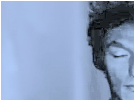The vision for what Surreal Poetics could be evolved over the course of the second and third issues to include art and poems in multiple languages. We are grateful to all of the poets and artists whose contributions to Surreal Poetics and dedication to the surrealist cause have made our endeavor successful. The fourth issue will return to a simpler format that focuses solely on the poem and seeks to observe the world through the surrealist’s penetrating gaze.
ƚԋҽ ρҽɳҽƚɾαƚιɳɠ ɠαȥҽ
THE EYE
allows us to see what lies outside of us, but it is also viewed as a window into our soul. The eye is an organ that reveals and deceives; as a symbol it suggests wisdom and knowledge, yet it can cast negative energy through its stare or inflict harm as the evil eye.
The Comte de Lautréamont accessed the heavens with his ρҽɳҽƚɾαƚιɳɠ ɠαȥҽ:
André Breton calls us to be seers in Surrealist Situation of the Object:
Thus the whole technical effort of Surrealism, from its very beginning up to the present day, has consisted in multiplying the ways to penetrate the deepest layers of the mental. “I say that we must be seers, make ourselves seers”: for us it has only been a question of discovering the means to apply this watchword of Rimbaud’s.²
For Issue 04: The Penetrating Gaze
Daren Berton, Editor
Surreal Poetics
[1] From the Second Canto. Comte de Lautréamont, Maldoror and the Complete Works, 3rd ed., translated by Alexis Lykiard, Cambridge: Exact Change, 2011, p.76.
[2] André Breton, “Surrealist Situation of the Object,” in Manifestoes of Surrealism, translated by Richard Seaver and Helen R. Lane, Ann Arbor: U of Michigan Press, 2010 Ann Arbor Paperbacks edition, 255-278, p.273.



 RSS Feed
RSS Feed
